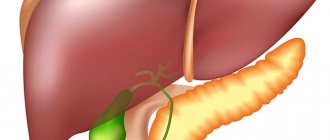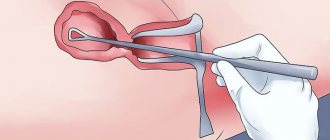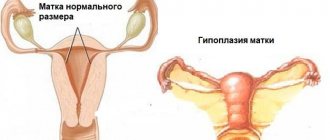Rating: No rating
One of the greatest and long-awaited joys for a woman is, of course, the joy of motherhood. Having learned about her pregnancy (according to the results of a test or confirmation from a doctor), a woman already casually looks at the display cases with children's things and toys, plans how and where she will give birth, comes up with a name for the future baby, etc. True, no one around has yet notices that you are pregnant, since the baby inside you is very tiny and is just beginning its difficult path of development and growth.
Unfortunately, your happiness may be darkened - medical statistics claim that a quarter of early pregnancies end in miscarriages. At this time, a woman may not yet be aware of the changes in her body. Then it is a little easier for her to cope with the pain of loss.
How to avoid early miscarriage? To do this, expectant mothers need to know what can trigger a miscarriage, what symptoms and signs it is accompanied by, how to prevent them and whether they can be avoided.
How does miscarriage occur in early pregnancy?
This problem in medicine is considered quite serious, because it is encountered frequently, and in most cases the process is almost impossible to stop . If a miscarriage or spontaneous termination of pregnancy occurs at the very beginning, then the woman may not even understand what happened.
Without realizing her situation, the woman simply thinks that the menstrual cycle has gone wrong or there has been a delay (usually a week or two). Then some feel minor pain in the abdomen , and menstruation begins, which, however, can be much heavier than usual. Not all women experience such bleeding, but only those who are frightened by the release of a blood clot, similar to a burst bubble.
However, it is worth going to the doctor , even if nothing else bothers you. They will do an examination to see if it was indeed an early miscarriage, and will also check whether additional cleaning is needed after this.
If a woman knows about her pregnancy, then she needs to be very attentive to any manifestations of pain or discomfort in the abdomen and back. The slightest spotting discharge mixed with blood or tissue clots is already dangerous. Sometimes the pregnancy can still be maintained , so you should consult a doctor immediately.
Spontaneous termination of pregnancy occurs before 12 weeks, which is classified as an early miscarriage. If it happens before 22 weeks, it will already be late. Unfortunately, this also happens for a number of reasons. Then doctors define this threat as premature birth, and with prompt and timely intervention they can save the premature baby.
Causes of threatened miscarriage in early pregnancy
Why does early miscarriage occur? Sometimes a woman faces this problem several times in a row . Doctors call this recurrent miscarriage.
The cause of spontaneous miscarriage in the early stages is very difficult to determine; this will require a comprehensive detailed examination, many different tests and appropriate treatment.
But it may also happen that even this will not help, that is, the termination of pregnancy will be influenced by factors that simply cannot be predicted or prevented.
The main reasons that cause or provoke miscarriage include a number of socio-biological and medical factors. The first group is purely personal and subjective reasons:
- unfavorable conditions (place of work in hazardous production, radiation, exposure to environmental toxins, difficult psycho-emotional background and microclimate in the family, etc.);
- unhealthy lifestyle and bad habits (if you are planning to conceive, then you should quit smoking, not drink alcohol, give up strict diets, excessive coffee consumption, adjust your diet and daily routine);
- a woman’s age is also often one of the reasons for miscarriage;
- Stressful situations , nervous shocks or strong emotions are a serious threat to a little life. A woman should protect herself from all this, but under no circumstances take sedatives, so as not to harm the baby even more. It is better to consult a doctor to find the right way out if stress cannot be avoided;
- do not ignore the danger that all kinds of physical activity can pose to a child. Avoid heavy physical work and do not lift heavy objects (even bags with groceries that weigh more than 5 kg are taboo for you). You will also have to approach sports with caution. Some types, especially extreme ones, cannot be combined with pregnancy. Be careful with hot baths, baths or saunas;
- If you have had an accident (unforeseen emergency, car accident, etc.) so that you are seriously injured or injured, your body may not be able to cope with maintaining the pregnancy. Even a minor fall due to negligence (uncomfortable shoes, ice, etc.) is dangerous.
Medical reasons or women's health problems
- Doctors say that early miscarriage is most often caused by genetic disorders or abnormalities in the fetus. A woman may suffer from a hereditary form of the pathology, although there are also isolated mutations that lead to the death of the embryo. This is influenced by a whole range of different factors: radiation, viruses, unfavorable environmental conditions, etc. It is no longer possible to control or stop this process. Thus, nature itself produces a kind of control, saving you from non-viable offspring. However, doctors recommend that couples who want to conceive a healthy child seek advice from a geneticist, and also carefully prepare for the upcoming pregnancy.
- Very often, the cause of spontaneous miscarriage in the early stages is hormonal disorders in a woman’s body. If you detect the problem in time and seek help from a doctor, this threat can be eliminated. The most common complaints are a lack of the hormone progesterone, although there are also cases of increased levels of male hormones. Problems with the thyroid gland and adrenal glands, which prevent the organs from functioning correctly and fully, also cause miscarriages. Usually in such cases, hormonal therapy or appropriate treatment is prescribed. It is better to check the condition of your body before pregnancy.
- Any pathology on the part of the immune system threatens termination of pregnancy. The most common manifestation is a complication in the form of Rh conflict. This means that your body is fighting an embryo that is foreign to it and rejecting it, because its blood Rh factor is negative, and the one taken from the father is positive. If this possibility exists, doctors recommend prophylaxis with immunomodulators.
- infection is very dangerous for pregnancy . This includes all sexually transmitted diseases: herpetic and cytomegalovirus infections, toxoplasmosis, chlamydia, syphilis, trichomoniasis and others. Due to the fact that the membranes are affected by viruses and pathogenic bacteria, the fetus itself can be infected, which leads to miscarriage.
- Also a serious risk for the baby are inflammatory diseases of internal organs and even common infectious diseases: viral hepatitis, rubella, influenza or sore throat with complications and fever, pneumonia and others. When planning a pregnancy, pay close attention to your health in order to identify and eliminate any possible dangers.
- Abortion is a huge stress for the female body . If previous pregnancies were interrupted artificially, then there is a huge risk of complications that lead to miscarriage or even secondary infertility. Be sure to tell your doctor if you have had an abortion before.
- The first trimester of pregnancy practically excludes the use of any medications , drugs and even herbs. All this often poses a great threat to the life of the fetus and affects its development. Never self-medicate, because even simple parsley as a seasoning can lead to increased uterine tone. Always consult your gynecologist and read the instructions carefully.
Miscarriage is also caused by the individual characteristics of a woman’s body. So, if she suffers from congenital anomalies of the structure of the uterus, isthmic-cervical insufficiency, oncological diseases of the genital organs or other pathologies, then often the pregnancy simply cannot be maintained.
Causes of miscarriage
The main reasons for termination of pregnancy are:
- Chromosomal pathologies of the fetus. This is perhaps the biggest reason why spontaneous miscarriage occurs. Specific damage to the genetic material causes the formation of non-viable embryos with anomalies incompatible with life. Therefore, such a pregnancy is independently terminated at its very beginning, that is, nature itself intervenes in the so-called natural selection and removes the wrong biological material.
- Rhesus conflict. This condition can occur if the expectant mother and father of the child have different Rh factors. As a result, an immunological conflict develops in the woman’s body, which becomes the cause of miscarriage. Read more about Rh conflict during pregnancy→
- Hormonal disbalance . An excess amount or, on the contrary, a deficiency of any hormones, for example, progesterone or androgen, leads to repeated miscarriages.
- Induced abortions are a thing of the past. Terminating a pregnancy in this way negatively affects a woman’s reproductive system. Even a single abortion can cause secondary infertility.
- Stress factor. Serious psycho-emotional and physical stress (lifting weights of more than 5 kg, etc.) do not always go away without leaving a trace and can lead to detachment of the ovum.
- Poor health of the expectant mother. A weak female body cannot provide the embryo with optimal conditions for subsequent growth and development. Acute infectious diseases suffered by a pregnant woman, such as rubella, chickenpox, influenza, etc., also play a negative role.
- Chemical factor, medications. Most drugs are able to penetrate the placental barrier, negatively affecting the developing fetus. Therefore, upon learning about her pregnancy, a woman should consult a doctor about any medications she takes, including those of herbal origin.
- Hidden infections. Many intimate diseases that occur in the latent phase can cause miscarriage.
Threatened miscarriage in the early stages: signs and symptoms
How to recognize an early miscarriage and what are the symptoms?
There are several main stages of spontaneous abortion, since it does not happen all at once. Each of these stages is characterized by its own symptoms according to the threat of miscarriage in the early stages, and sometimes this can be stopped or prevented if you seek treatment from a doctor in time.
So, the first signs of a miscarriage in the early stages, which should alert you to any manifestations of pain or pain in the back and abdominal area, which are accompanied by brown or red discharge . Sound the alarm even if a few drops of blood appear from the vagina, because this may already indicate an early miscarriage. Also pay attention to your condition: have the main signs of pregnancy disappeared?
Do not miss scheduled visits to the doctor , mandatory tests or necessary examinations. This way you can rule out any pathologies in the development of your baby and be confident that the pregnancy is going well.
Main stages of miscarriage
- Threat or risk of spontaneous abortion. This condition happens very often, which is why some women are forced to remain in bed for almost the entire 9 months. It is characterized by the above-mentioned cramping pains and bleeding, sometimes even very copious ones. You can also note increased uterine tone.
- The second stage is more serious - it is classified as an incipient miscarriage or spontaneous abortion. The fertilized egg has already partially detached from the walls of the uterus, so the symptoms of spontaneous miscarriage in the early stages will be pronounced. But doctors still consider this stage to be reversible, that is, with prompt and qualified intervention, they can save your child’s life.
- With the so-called “miscarriage in progress,” the pregnancy cannot be saved. At this stage, the woman feels severe and sharp pain, and heavy bleeding occurs almost immediately. The fertilized egg has already died, and the cervix is open, so it can come out all at once or in parts, which will be considered an incomplete miscarriage.
- The last stage is a completed spontaneous abortion . The uterus, having expelled the dead fertilized egg, contracts and returns to its previous size.
Also, on an ultrasound, the doctor can detect a failed abortion or fading pregnancy, when due to some reason the fetus died, but the miscarriage did not occur. This is also a very dangerous condition, because suppuration or blood poisoning is possible if the necessary measures are not taken in time.
Diagnostics
Diagnosis of spontaneous miscarriage is based on the clinical symptoms described above, examination of the woman in the gynecological chair and an ultrasound examination.
Using ultrasound, you can detect the fertilized egg and symptoms of miscarriage from the 3rd week of pregnancy. If during the examination the doctor diagnoses fetal heartbeat, minor blood clots in the cavity of the reproductive organ and a closed cervix, then the prognosis for maintaining such a pregnancy is at least 97%.
If bleeding from the genital organs does not stop, and an ultrasound examination reveals a deformation of the fetal egg, the absence of a fetal heartbeat, or it lags behind in development beyond the expected gestational age, an abortion is inevitable; there is no point in maintaining such a pregnancy.
Often, with uterine bleeding or severe pain in the lower abdomen, a retrochorial hematoma is detected on ultrasound. If its size is small and the fetus continues to develop, then this condition is not considered dangerous. With serious detachment of the ovum and a large hematoma, the likelihood of miscarriage and bleeding is quite high.
HCG research is carried out in the early stages of pregnancy, when the viability of the embryo cannot yet be diagnosed by ultrasound. If the gestation period is 4 weeks, and the fertilized egg is not detected in the uterine cavity, then the hCG study is carried out twice with an interval of 48 hours.
Diagnosis of threatened miscarriage
The main diagnostic method is ultrasound examination . At the slightest suspicion of a miscarriage, it is better to immediately consult a doctor.
Both signs and symptoms may vary, but the hospital will be able to comprehensively examine you, using an ultrasound to find out what stage of spontaneous abortion you are at, and what can be done to save the baby (if this is still possible).
Another method that helps you understand whether the baby is alive is to measure the level of hCG in your blood: it will be significantly lower if the pregnancy is terminated.
What to do if you suspect a miscarriage
If you notice bleeding with clots, place a sanitary pad on your underwear. If more than two pads are needed per hour or you experience severe cramping, contact your doctor or emergency room immediately. The doctor will look at your cervix to see if it is open. Your blood will be taken to test your hCG levels to find out how far along you are in your pregnancy, and then tested again to see if your levels are rising or falling. If it increases, your pregnancy is most likely progressing, but if it decreases, a miscarriage occurs. You will likely have an ultrasound to check your heartbeat and make sure it is not an ectopic pregnancy. If you are at risk of miscarriage, your doctor may prescribe certain treatments if they feel it makes sense. You will most likely be sent home and asked to rest, although the benefits of bed rest have not been proven. If the bleeding stops and you have symptoms of pregnancy, in many cases it will progress further. If your pregnancy symptoms suddenly disappear and severe cramping and clots begin, your doctor will allow you to have a miscarriage at home. The doctor may suggest that you bring in clots and tissue for examination if this is not your first miscarriage.
Treatment for threatened miscarriage in the early stages
If you managed to identify the threat and sought medical help in time (in the early stages), then in the future you should be even more careful and strictly follow all the recommendations of your doctor.
To maintain a pregnancy, a woman may need to:
- observe bed rest and eliminate any physical activity (in special cases it becomes necessary to go to the hospital for preservation);
- get rid of negative experiences, stress, anxiety;
- take hormonal medications or immunomodulators (as prescribed by a doctor);
- undergo antiviral, antifungal, antibacterial therapy;
- surgical intervention (in the case of isthmic-cervical insufficiency, the doctor will place sutures on the cervix, which will be removed only before childbirth. This way, the growing fetus will be able to stay in the cavity. There is also surgical correction for abnormal structures of the uterus, although not in all cases.
Symptoms of the onset of a miscarriage
If symptoms of spontaneous abortion are detected, a woman should immediately seek medical help. The following may indicate a spontaneous abortion:
- unexplained and sudden weight loss;
- disappearance of pregnancy symptoms (breast swelling, toxicosis, drowsiness);
- false contractions;
- real contractions, accompanied by severe pain and frequency;
- disorders of the gastrointestinal tract;
- red, brownish or dark brown discharge;
- increased bleeding with clots, cramps and pain in the lower abdomen or lumbar region;
- any unusual vaginal discharge.
The most basic signs that help determine an incipient miscarriage are pain and bleeding. When there is a threat, discharge may not be red, but brown. But this factor should not confuse the expectant mother and force her to seek help from a doctor.
An increase in uterine tone is also a sign of an imminent abortion, but only in cases where it is accompanied by severe pain in the lower abdomen. You can avoid such a combination of circumstances by refusing to lift weights and exercise.
With a frozen or ectopic pregnancy, a complete miscarriage does not always occur, so contacting a doctor with the described symptoms is mandatory.
Prevention of miscarriage
How to prevent the threat of early miscarriage? To avoid the most common causes of threatened miscarriage in the early stages, you should undergo all the necessary examinations . This way you can exclude possible problems in the form of pathologies, chromosomal disorders, infectious or hormonal diseases, vitamin deficiency, etc.
Of course, a couple who wants to conceive a full-fledged and healthy child must reconsider their lifestyle, giving up bad habits and adjusting their diet.
Treatment and consequences after miscarriage in early pregnancy
What to do after a miscarriage in early pregnancy? If it did happen that the pregnancy could not be maintained and you lost the child, then you need to undergo therapy, which is mandatory after a miscarriage. The doctor should send you for an examination of the body to determine the reason that caused the miscarriage (if this has not been done previously).
You definitely need to check whether the fertilized egg has completely left the walls of the uterus, since if the abortion is incomplete or not completed, you will need curettage. Antibiotics will also be to help cope with a possible infection, and hormonal contraceptives. This stabilizes your hormonal levels.
In addition to the physical stress on the body, a miscarriage is a very serious psychological and emotional test for any woman. The pain of loss can develop into severe, protracted depression, especially if the pregnancy was long-awaited and desired. Don’t isolate yourself during this difficult time, try to trust your spouse, parents, and loved ones so that they will support you and help you get through the grief. Allow yourself to be sad and cry, you can even seek help from a psychologist if you are unable to cope with your feelings.
You should not be afraid of the same failures in the future and despair. Just be more responsible in your next pregnancy planning after an early miscarriage. Remember that the body still needs recovery , so do not rush to become a mother again for at least six months. During this time, you can get rid of existing problems, take a course of necessary vitamins, and undergo complex therapy prescribed by the doctor.
The correct psychological attitude and only positive thoughts that everything will be fine with you, and after a certain period of time you will take your long-awaited baby in your arms is also very important.
Recommendations for pregnant women
If you find out that you are carrying a small life inside you, then you need to minimize as much as possible the potential risks that could lead to miscarriages. Follow simple rules: adjust your diet, give up bad habits, lead a healthy lifestyle, don’t overwork, be extremely careful, avoid stress and nervous shock.
Be sure to register with the antenatal clinic . The doctor will help identify illnesses or problems that you did not even know about, but that may pose a threat to your baby. Timely treatment or prevention will help prevent the threat of miscarriage. Follow all the recommendations your gynecologist gives you.
At the slightest sign of danger, go to the hospital immediately . In most cases, pregnancy can still be maintained. If you have experienced the loss of a child, do not despair and do not be alone with your pain.








